Criminal law is used to deter and punish unwanted behaviour. This includes unwanted sexual behaviour – ranging from rape, incest, sexual violence and transmission of HIV via various forms of “irregular” consensual sexual relations (outside marriage, same-sex sexual behaviour, sex work) to provision of/access to sexual and reproductive health information and services, such as abortion. Criminalization of sexual and reproductive actions and services has intended as well as unintended consequences – including for mental health and for the provision and uptake of health services. But how can health consequences of (de)criminalization best be studied? In this roundtable researchers from the law faculty in Bergen studying effects of criminal law meets researchers about to embark on a new LawTransform project investigating health effects of (de)criminalization of abortion and homosexuality in Africa.
Chair: Jørn Jacobsen
Introduction: Siri Gloppen; Ana Cristina Gonzales
Participants in the debate include: Dawit Desalegn, Ingrid Miljeteig, Adrian Jjuuko, Camila Gianella, Maja Janmyr, Malcom Langford

